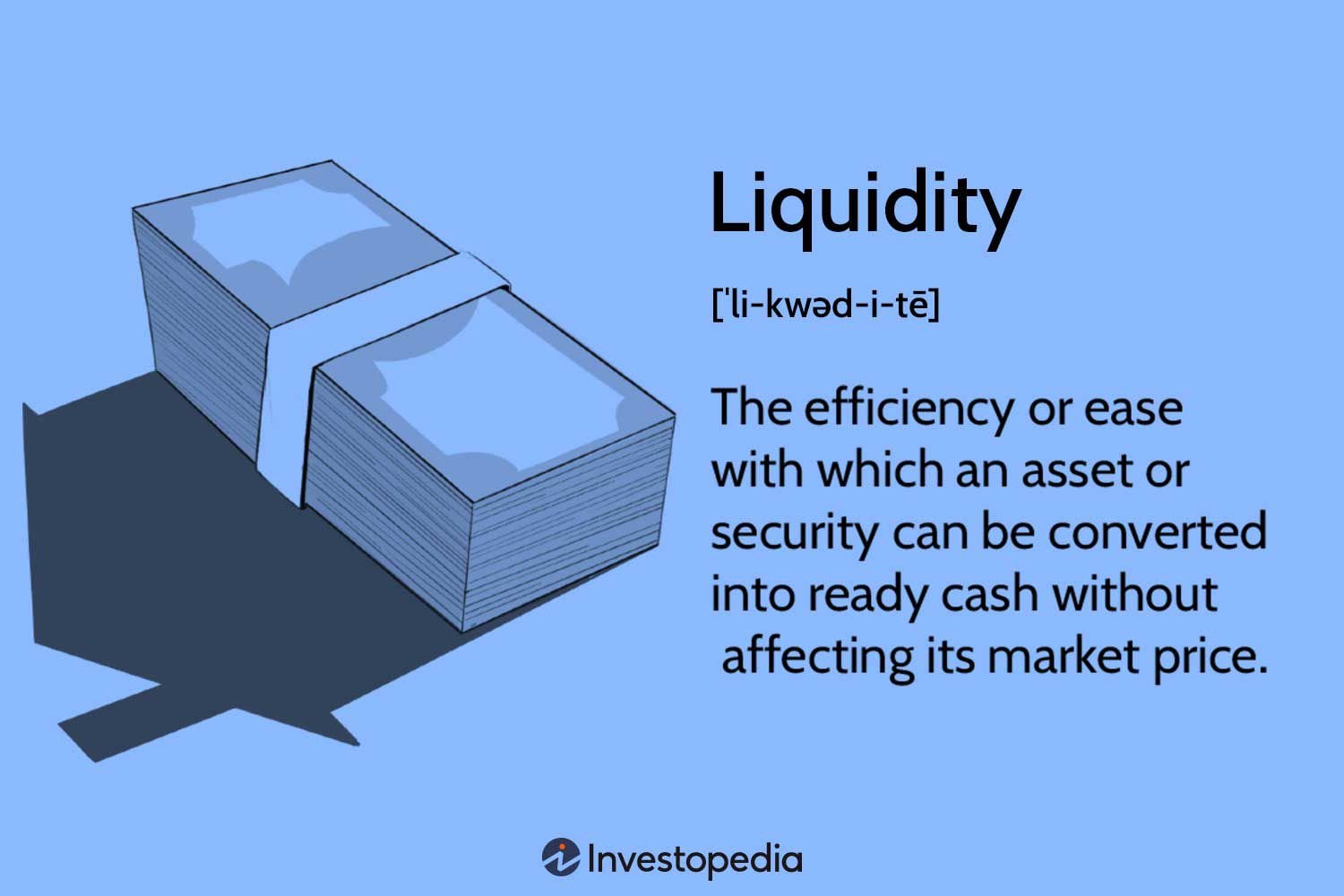Market liquidity is a fundamental concept in the field of finance, yet its importance is often overlooked or misunderstood. In simple terms, market liquidity refers to the ease with which an asset can be bought or sold without significantly impacting its price. But why does this matter? Understanding market liquidity is crucial for investors and traders alike, as it directly affects the efficiency and stability of financial markets. Without it, transactions become cumbersome and costly, hindering market participants and impeding economic growth. So, let’s delve deeper into what market liquidity is and why it plays a vital role in our financial ecosystem.
What is Market Liquidity and Its Importance
Market liquidity refers to the ease with which an asset, such as a stock, bond, or commodity, can be bought or sold in the market without significantly impacting its price. It represents the degree to which an asset can be converted into cash quickly, without causing a significant change in its market value. Market liquidity is crucial for the smooth functioning of financial markets and plays a vital role in determining the efficiency and stability of the overall economy.
The Concept of Market Liquidity
Market liquidity can be influenced by several factors, including the number of buyers and sellers in the market, the depth of the market, and the ease of executing trades. Generally, assets that are highly liquid have a large number of participants actively trading them, resulting in a tight spread between bid and ask prices. On the other hand, illiquid assets have fewer participants, wider spreads, and may experience price volatility when trades are executed.
Liquidity is often measured using metrics such as trading volume, bid-ask spreads, and price impact. Higher trading volumes indicate greater market liquidity, as there are more buyers and sellers actively participating in the market. Narrow bid-ask spreads indicate a liquid market, as buyers and sellers can transact at prices close to each other. Price impact refers to the effect of a trade on the asset’s price, and a high price impact suggests lower market liquidity.
The Importance of Market Liquidity
Market liquidity is essential for several reasons:
1. Efficient Capital Allocation: Liquidity enables market participants to buy and sell assets quickly, allowing capital to flow efficiently to its most productive use. It ensures that investment opportunities are accessible, facilitating capital allocation to companies, projects, and individuals that need it the most.
2. Price Stability: Liquidity helps maintain stable asset prices by reducing the impact of large buy or sell orders on market prices. When markets are liquid, investors can enter or exit positions without causing significant price distortions. This stability reduces the risk of sudden price swings, protecting investors and market integrity.
3. Risk Management: Liquidity is crucial for risk management strategies. It allows investors to easily adjust their portfolios, hedge their positions, or exit investments in response to changing market conditions and risk profiles. Without sufficient liquidity, investors may face challenges in implementing risk management strategies effectively.
4. Access to Financing: Liquid markets provide companies and governments with avenues to raise capital efficiently. When markets are liquid, issuers can sell their securities at fair prices, attracting a broad range of investors. This access to financing promotes economic growth, job creation, and facilitates innovation.
5. Price Discovery: Liquidity supports price discovery, the process by which market participants determine the fair value of an asset. In liquid markets, the constant flow of buy and sell orders helps establish more accurate and transparent prices. This price transparency benefits all market participants and ensures that assets are valued correctly.
Liquidity Providers
In financial markets, liquidity is often provided by specialized market participants known as liquidity providers. Liquidity providers are typically institutional investors, banks, or market makers who facilitate trading by continuously quoting bid and ask prices for various assets.
These market participants play a crucial role in ensuring market liquidity by standing ready to buy or sell securities at quoted prices. Their presence helps reduce transaction costs, enhances market depth, and provides confidence to other market participants. Liquidity providers earn profits by capturing the bid-ask spread and managing their inventory efficiently.
Impacts of Illiquidity
Illiquidity, or the lack of market liquidity, can have significant consequences:
1. Higher Transaction Costs: Illiquid markets often exhibit wider bid-ask spreads, resulting in higher transaction costs for buyers and sellers. This can discourage trading and limit market participation.
2. Increased Price Volatility: Illiquid markets are prone to price volatility, as large buy or sell orders can have a significant impact on asset prices. This volatility can make it challenging to accurately value assets and may deter investors.
3. Lower Market Efficiency: Illiquidity can hinder efficient capital allocation, as investors may face difficulties buying or selling assets at fair prices. This can lead to suboptimal investment decisions and potential mispricing of assets.
4. Reduced Access to Financing: Companies operating in illiquid markets may struggle to raise capital at favorable terms. Limited access to financing can hamper investments, growth, and innovation.
5. Increased Systemic Risk: Illiquidity in one market can spill over to other interconnected markets, amplifying systemic risks. A lack of liquidity during times of market stress can contribute to heightened market volatility and potential contagion effects.
Measuring and Monitoring Liquidity
Market participants and regulators employ various metrics and tools to measure and monitor market liquidity. Some commonly used measures include:
1. Trading Volume: The total number of shares or contracts traded in a given period is a useful indicator of market liquidity. Higher trading volumes suggest greater market participation and liquidity.
2. Bid-Ask Spreads: The difference between the highest price a buyer is willing to pay (bid) and the lowest price a seller is willing to accept (ask) reflects the liquidity of a market. Narrow spreads indicate higher liquidity.
3. Order Book Depth: Order book depth measures the number of buy and sell orders at different price levels. Deeper order books indicate greater market liquidity and the ability to execute larger trades without significant price impact.
4. Price Impact: Price impact measures the degree to which executing a trade affects an asset’s price. Higher price impact suggests lower liquidity, as trades have a more substantial effect on prices.
Market participants also rely on trading platforms, electronic exchanges, and market surveillance tools to monitor liquidity in real-time and identify potential liquidity issues.
Market liquidity is a critical aspect of financial markets, facilitating efficient capital allocation, promoting price stability, and enabling risk management. It enhances access to financing, supports price discovery, and ensures the smooth functioning of economies. Understanding the concept of market liquidity and its importance is crucial for investors, regulators, and all participants in the financial ecosystem. By monitoring and maintaining adequate liquidity, markets can foster transparency, stability, and growth.
What is liquidity?
Frequently Asked Questions
Frequently Asked Questions (FAQs)
What is market liquidity?
Market liquidity refers to the ease with which an asset or security can be bought or sold without causing a significant change in its price. It is a measure of the market’s ability to facilitate the flow of investments and ensure efficient transactions.
Why is market liquidity important?
Market liquidity is important because it enhances market efficiency and stability. It provides investors with the ability to enter or exit positions quickly, without causing disruptions or significant price changes. It also helps ensure fair and transparent pricing for securities.
How does market liquidity affect price?
Market liquidity can impact prices in various ways. In highly liquid markets, large buy or sell orders have minimal impact on prices. On the other hand, in illiquid markets, even small orders can cause significant price movements. The relationship between liquidity and price depends on supply and demand dynamics.
What are the factors that affect market liquidity?
Several factors can affect market liquidity, including trading volume, bid-ask spreads, transaction costs, market depth, and the number of market participants. Economic conditions, regulatory changes, and market volatility can also influence liquidity levels.
How does market liquidity impact financial institutions?
Financial institutions rely on market liquidity to manage their own positions and meet the needs of their clients. Insufficient liquidity can create challenges for these institutions, making it harder for them to buy or sell assets at fair prices or meet their obligations in a timely manner.
What are the advantages of high market liquidity?
High market liquidity offers several advantages, including tighter bid-ask spreads, lower transaction costs, increased trading volume, and improved market efficiency. It also provides investors with greater opportunities for executing trades at desired prices.
What are the risks associated with low market liquidity?
Low market liquidity can pose risks for investors and market participants. It can result in wider bid-ask spreads, higher transaction costs, increased price volatility, and difficulties in executing trades. It may also limit the ability to exit positions quickly during market downturns.
How can market liquidity be measured?
Market liquidity can be measured using various indicators, including bid-ask spreads, trading volume, market depth, and price impact of trades. These metrics help assess the ease of trading in a particular market and provide insights into liquidity conditions.
Final Thoughts
Market liquidity refers to the ease with which financial assets can be bought or sold in the market without causing significant price fluctuations. It is an essential aspect of any financial market, providing investors with the ability to enter or exit positions quickly and efficiently. The importance of market liquidity cannot be overstated, as it ensures that transactions can be conducted swiftly and at fair prices. Additionally, market liquidity promotes price discovery and helps to maintain market stability. Without adequate liquidity, markets can become illiquid, leading to increased volatility and risk for investors. Therefore, understanding and monitoring market liquidity is crucial for investors and market participants alike.



